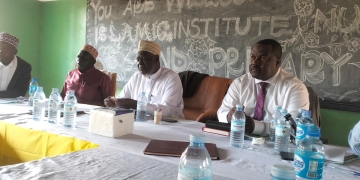
KAMPALA, Uganda — Makerere University has been selected to participate in the second phase of an e-Learning initiative, aimed at creating a five-year digital pedagogy transformation roadmap (2025-2030), the university announced Thursday.
The project is spearheaded by the College of Education and External Studies (CEES) through its Institute of Open, Distance and e-Learning (IODeL). The Mastercard Foundation will support the second phase, building on the successful implementation of the first phase (2021-2024) of its Scholars Program e-Learning Initiative at Makerere.
Prof. Paul Birevu Muyinda, Director of IODeL, highlighted the partnership with the Mastercard Foundation and Arizona State University (ASU) in this endeavor. “In a bid to consolidate the gains of phase 1 and transition into a digitally resilient and learner-centred institution, Makerere University has been selected to participate in phase 2 of the e-Learning Initiative,” he said during a workshop on April 24.
Phase 1 achievements included training 1,280 faculty members, developing over 2,500 online courses, creating four support services modules, building capacity for more than 7,000 students, training 32 e-Learning champions, upgrading the Makerere University e-Learning Environment (MUELE), and acquiring essential infrastructure like multimedia studios and servers.
The co-creation workshop for phase 2 brought together over 75 participants, including university management, faculty, students, representatives from the Ministry of Education and Sports, Mastercard Foundation, and ASU. The sessions, facilitated by ASU and IODeL, focused on leveraging the successes of phase 1 and developing strategies for the new roadmap.
The roadmap will address key areas such as teaching and learning, student services, instructional infrastructure, leadership and culture, and partnerships. Participants proposed immediate, short-term, and long-term digital transformation strategies for each area.
Prof. Buyinza Mukadasi, Ag. Deputy Vice Chancellor (Academic Affairs), conveyed the university’s support for the initiative, emphasizing its potential to position Makerere as a leader in digital education and increase access to quality education nationally and internationally. He commended the Mastercard Foundation and ASU for their partnership in empowering young people through education and technology.
Prof. Anthony Muwagga Mugagga, Principal of CEES, stressed the importance of inclusive digital strategies, including those for students with visual and hearing impairments.
Ann Nielsen of the Mastercard Foundation noted that phase 2 will prioritize scaling training, knowledge mobilization, and inclusive learning practices. The foundation aims to enhance digital infrastructure and advocate for e-learning as a recognized pathway to quality education across the continent.
Regan Matsiko, IT Officer at the Ministry of Education and Sports, affirmed the ministry’s commitment to digital advancement and its collaboration with universities in developing e-learning programs.
The co-creation workshop aimed to envision e-learning-driven classrooms for Makerere and its partners, aligning initiatives with university strategies and community programs. The goal is to develop a transformative roadmap and implementation plan to attract funding and partnerships.
Prof. Birevu Muyinda concluded the workshop by highlighting the understanding gained of key activities and priorities for the upcoming phase. Makerere University, with the support of its partners, is focused on developing a comprehensive e-learning roadmap to drive innovation in education.










